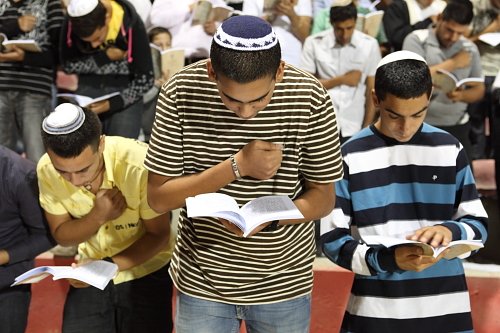My good friend Rabbi David Brofsky shared a Facebook post defending Selichot:
There’s a lot of complaining this time of year- Selichot.Rabbi Brofsky is right. Selichot today has a "bad name." Today it's Carlbach Selichot. Here in Israel, Tours of Jerusalem end with a recitation of Selichot somewhere in the Old City. It's not enough to pray; Selichot needs to be an experience.
First, it’s a significant addition to the three daily tefillot, and it’s a considerable hit to one’s sleeping schedule, either early in the morning or at night. Waking up at ashmoret ha-boker is a beautiful idea. As an idea.
Second, they are rather difficult to understand. At least fully.
The Shulchan Arukh (OC 1:4) writes טוב מעט תחנונים בכוונה, מהרבות בלא כוונה (better few supplications with concentration than much without concentration). R. Hutner adapted this statement: טוב מעט בלי כוונה מהרבה בלי כוונה. In fact, in Yeshivat Chaim Berlin (and Pachad Yitzchak in Israel), I have heard that they say abridged selichot. I full identify with this sentiment: I often say a shorter, abridged Tachanun (Mon and Thurs), Pesukei De-Zimra, Kinot and of course, Zkhor Berit (Erev RH).
But, I also have to say the following: I enjoy Selichot. I find them meaningful. I like saying (yelling?) the first part ('לך ה and שומע תפילה). I enjoy finding the rhythm in the different selichot, even if I don’t always fully understand the meaning. I say the 13 midot of rachamim with great awe and trepidation, as I recall the image of God revealing them to Moshe, as the key to forgiveness. I like the tune of the final pizmon, and how the sheliach tzibbur and the tzibbur say each part. Yes, and I love rushing through the zkhor rachamekha, hoping to say ve-havi’otim before the sheliach tzibur says shema koleinu. Shema Koleinu! Hashiveinu! Al tashlikheinu! How can one not find meaning in a good confession (viduy)? And racing through the final aneinus matches the Rav’s description of “tze’aka”- a prayer said in a time of crisis - spiritual crisis.
Finally, the voices and tunes of decades of ba’alei tefila are in my head; R. Amital’s deep yet haunting tefillot ring in my ears (see minute 28 below..).
There is meaning in tradition. There is meaning in structure. There is meaning in years and years of melodies. And there is meaning in oscillating between slow and fast, and whispering and screaming, while the voices of great baalei tefilla echo in one’s ears. I wouldn’t trade that for all the uplifting “hashiveinu”s and funky “rachamana”s out there.
I agree with everything that Rabbi Brofsky wrote, except I really don't usually experience Selichot as uplifting and passionate. Nor, really, do I expect them to be.
In theory, it would be great if I had a passionate religious experience every time I pray. But I don't - far from it. Nor do I think it's reasonable to have that expectation. Human nature is such that we experience rhythms in life - highs and lows, and I believe the expectation of a perpetual spiritual high is unreasonable, unrealistic, and unfair to ourselves.
This same rule applies to the recitation of Selichot. I don't get much out of Selichot (less so after midnight, which is why I say the Sunday morning Selichot on Sunday morning, at not at 12:30am) Despite the lack of such a high, I still make a concerted effort to say Selichot (albeit too fast) as I think that they're very important even without that spiritual high. This is because to me Selichot is a process building towards the end goal of Yom Kippur.
I see Selichot both as an intentional slog, an extra effort we make around the Yamim Noraim, and also a way to gradually move towards the Tefillot on Yom Kippur. If a person experiences Yom Kippur on the first night of Selichot, what then can he expect to have left later on? During the waning moments of Yom Kippur, I always think of - and in truth feel bad for - the people who don't say Selichot leading up to Rosh Hashanah and during the Aseret Yemei Teshuvah. At that time, as we're piercing the heavens with the 13 Middot of Rachamim, we pause between each volley for a brief recitation, a respite of sort, most of which recall Selichot we have recited over the past weeks.Each stanza takes me back to those early morning Selichot, and gives me a bit more strength to push forward. Neilah - like everything else is life - means so much less if you didn't put in the time during the weeks of Selichot, steadily building momentum with each passing day.
I don't for a minute think that my Selichot this morning were Neilah. Nor do I think they should be. Selichot are a slog. But to my mind, that just how they're supposed to be.


No comments:
Post a Comment
Comments transform a blog into a community. Please join.